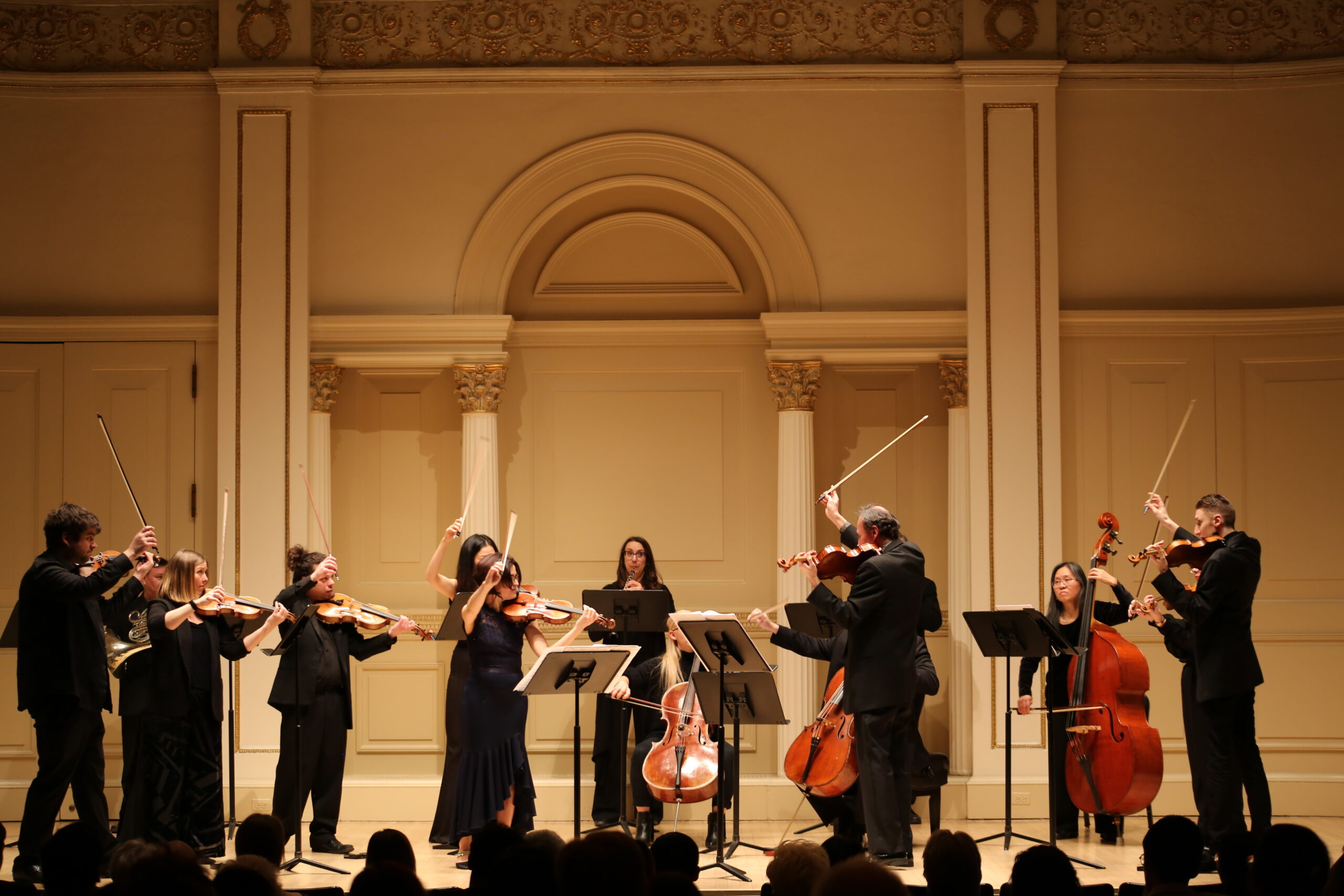
- This event has passed.
Resplendent Revival – Polish Renaissance of the 20th Century
Sunday, January 14 @ 7:30 pm
$30 – $40

 In Program:
In Program:
Edvard Grieg: Suite, Op. 40, “From Holberg’s Time”
Grażyna Bacewicz: Concerto for String Orchestra
Roman Palester: “Nocturne for Strings” (an American Premiere)
Wolfgang Amadeus Mozart: Sinfonia Concertante for Violin, Viola in E♭ major, K. 364
The Connecticut Virtuosi’s upcoming program is an absolute must-see for any music lover! With a lineup of composers who have played a pivotal role in shaping the contemporary music of Eastern Europe, this concert promises to be an extraordinary experience. From the captivating composition of Grażyna Bacewicz and the American Premiere of “Nocturne” by Roman Palester, framed by the masterpieces of Grieg and Mozart, the audience will be taken on a thrilling musical journey. The virtuosity and passion of the performers combined with the brilliance of these composers’ works will undoubtedly leave a lasting impression. Don’t miss out on this opportunity to immerse yourself in the vibrant music of Eastern Europe!
Roman Palester (1907-1989) was a Polish composer and pianist known for his innovative and distinctive musical style. Born in Śniatyń, Poland, Palester showed an early talent for music, beginning piano lessons at the age of seven and studying at the prestigious Music Institute in Kraków by the age of twelve. He furthered his education in music theory and composition at the Warsaw Conservatory, graduating in 1931 under the guidance of Kazimierz Sikorski. Palester’s career was marked by his strong political convictions, which often landed him in trouble with the authorities. During World War II, he was briefly imprisoned in Warsaw’s Pawiak prison due to his outspoken views. Despite these challenges, Palester’s reputation as a composer continued to grow, and by the late 1940s, he was widely regarded as one of Poland’s greatest living composers. However, his refusal to conform to the principles of Socialist Realism and his association with Radio Free Europe led to his exile from Poland. Despite this setback, Palester continued to compose abroad, experimenting with twelve-tone serialism in his later works. While his compositions were highly regarded throughout Europe, it was not until the late 1970s that the censorship ban on his work was lifted by the Polish Composers’ Union. Although his music has fallen from the public view in Poland in recent years, Palester’s contributions to modern Polish composition remain significant and he is highly regarded among specialists in the field.
Palester’s “Nocturne for String Orchestra” was composed in 1947 and revised in 1954. This piece is a significant work in Palester’s repertoire, showcasing his unique compositional style. The Nocturne was premiered by the Orchestra of the Polish Radio and Television in Kraków, conducted by Szymon Kawalla in 1978. Palester’s music, including the Nocturne, is known for its individuality and new compositional thinking.
Grażyna Bacewicz, born on February 5, 1909, was a Polish composer and violinist of Lithuanian origin. She is recognized as the second Polish female composer to have achieved national and international recognition, following Maria Szymanowska in the early 19th century. Bacewicz was born in Łódź, and her father, Wincenty Bacewicz, gave her her first piano and violin lessons. In 1928, she began studying at the Warsaw Conservatory, where she studied violin with Józef Jarzębski and piano with Józef Turczyński, and composition with Kazimierz Sikorski, graduating in 1932 as a violinist and composer. She continued her education in Paris, having been granted a stipend by Ignacy Jan Paderewski to attend the École Normale de Musique. She studied there in 1932–33 with Nadia Boulanger (composition) and André Touret (violin). After completing her studies, Bacewicz took part in numerous events as a soloist, composer, and jury member. From 1936 to 1938, she was the principal violinist of the Polish Radio Orchestra.
Grażyna Bacewicz’s Concerto for String Orchestra, composed in 1948, is often referred to as her opus magnum. It is considered one of the foremost works of 20th-century Polish music and is frequently performed at subscriber concerts. The concerto, which consists of three movements: Allegro, Andante, and Vivo, was premiered by the Polish Radio Symphony Orchestra. This significant work earned Bacewicz the State Award of the 3rd Degree in 1950 and continues to captivate audiences worldwide.
Wolfgang Amadeus Mozart’s “Sinfonia Concertante for Violin, Viola, and Orchestra in E-flat major, K. 364 (320d)” was composed in 1779. At the time of its composition, Mozart was on a tour of Europe that included Mannheim and Paris⁴. This piece is considered Mozart’s most successful realization in the sinfonia concertante genre, a cross-over genre between symphony and concerto. The piece is scored in three movements for solo violin, solo viola, two oboes, two horns, and strings, the last including a divided viola section, which accounts for the work’s rich harmony. The three movements of the piece are Allegro maestoso, Andante, and Presto.
The “Holberg Suite, Op. 40”, more properly titled “From Holberg’s Time” (Norwegian: Fra Holbergs tid), subtitled “Suite in olden style” (Norwegian: Suite i gammel stil), is a suite of five movements based on eighteenth-century dance forms. It was written by Edvard Grieg in 1884 to celebrate the 200th anniversary of the birth of Dano-Norwegian humanist playwright Ludvig Holberg (1684–1754). The suite was originally composed for the piano, but a year later was adapted by Grieg himself for string orchestra. The suite consists of an introduction and a set of dances. It is an early essay in neoclassicism, an attempt to echo as much as was known in Grieg’s time of the music of Holberg’s era.


